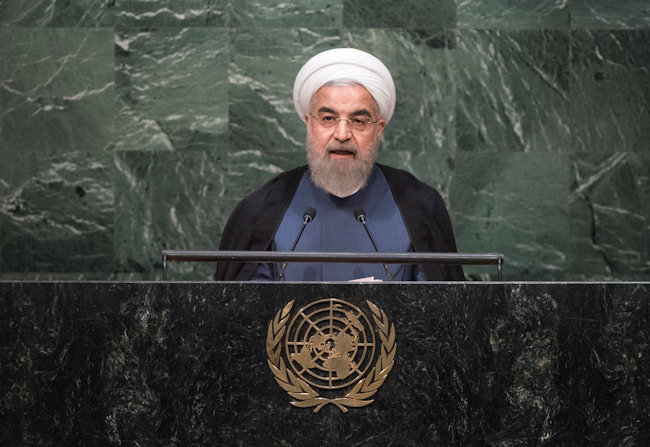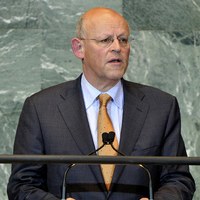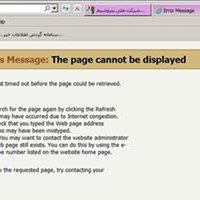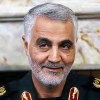![]()
28 September 2015 | un.org
Statement by
H.E Dr. Hassan Rouhani
President of the Islamic Republic of Iran
at the General Debate of the General Assembly of the United Nations
28 September 2015
In the name of God, the most Compassionate, the most Merciful
Praise be to Allah, and peace and greetings to Prophet Mohammad and his true companions
Mr. President

Hassan Rouhani, President of the Islamic Republic of Iran, addresses the general debate of the General Assembly’s seventieth session. (UN Photo/Cia Pak)
I am speaking on behalf of a great nation who is mourning the loss of thousands of Muslim pilgrims and hundreds of its citizens. Old, young, men and women who had come together in the grand and global spiritual gathering of the Hajj, but unfortunately fell victim to the incompetence and mismanagement of those in charge. Due to their unaccountability, even the missing cannot be identified and the expeditious return of the bodies of the deceased to their mourning families has been prevented. The scope of a calamity in which thousands of innocent people from the four comers of the world have been killed and wounded is so broad that it cannot be dealt with as a natural disaster or a local issue. The pain and emotional distress inflicted on millions of Muslims is greater than what can be repaired merely through material calculations. Public opinion demands that Saudi Arabian officials promptly fulfill their international obligations and grant immediate consular access for the expeditious identification and return of the cherished bodies. Moreover, it is necessary that the conditions are prepared for an independent and precise investigation into the causes of this disaster and ways of preventing its repetition in the future.
Mr. President
Distinguished Secretary-General
Excellencies,
Ladies and Gentlemen,
I am speaking on behalf of a nation that, two years ago, again voted for constructive engagement with the world and I can now proudly announce that “today, a new chapter has started in Iran’s relations with the world.”
Two years ago, the people of Iran in a competitive election, with their votes gave me a mandate for consolidating peace and constructive engagement with the world — whilst pursuing national rights, interests and security. This national will, manifested itself through a careful and clear diplomatic effort which resulted in the Joint Comprehensive Plan of Action (JCPOA) between the Islamic Republic of Iran and the six world powers that was immediately turned into an international instrument with the ratification of the United Nations Security Council. From the “standpoint of international law, this instrument sets a strong precedent where, for the first time, two sides rather than negotiating peace after war, engaged in dialogue and understanding before the eruption of conflict.
At this point, I deem it necessary to recognize the role of all the negotiators, the leaders and the heads of state and government of the United States, the United Kingdom, France, Russia, Germany, China and the Islamic Republic of Iran in achieving this agreement. We had decided to bring about a new environment while maintaining our principles and we succeeded in doing so. Where necessary we moved forward and where necessary we showed the courage for flexibility; and, at each point, we made use of the full capacity of international law and showcased the potentials of constructive dialogue. The key point regarding the success of dialogue is the fact that any actor in the international system who pursues maximalist demands and does not allow space for the other side cannot speak of peace, stability and development. As in commerce and economic activity, where the interests of both parties should be taken into account, in politics and international relations as well multilateralism and win-win solutions should be the basis of engagement.
Mr. President,
The United Nations was established to sustain global peace and security after two world wars. But unfortunately, it must be said that in most cases this important international institution has not been successful or effective. This time, however, the United Nations made the right decision.
Though, we protest the adoption of unfair resolutions against the Islamic Republic of Iran and the imposition of sanctions against the Iranian nation and government as a result of misunderstandings and sometimes overt hostilities of some countries, however, we believe, as an old Iranian saying goes, “the sooner you stop harm, the more benefit you will reap”. Today, is the very day that harm is stopped.
Security Council Resolution 2231, despite some significant shortcomings, was an important development and the basis for terminating sanctions imposing resolutions against Iran. We consider as unfair the conduct of the Security Council in the past and insist that Iran, due to the important fatwa of its leader and its defense doctrine, has never had the intention of producing a nuclear weapon and, therefore, sanctions resoiut!ons against 1ran were unjust and illegal. Sanctions by the Security Council and unilateral sanctions by some countries were based on illusive and baseless allegations and created difficult conditions for our people. But these sanctions never in any way affected the policy we adopted and the approach we took towards negotiations. We proved in these negotiations that there is nothing on Iran’s table other than logic, reason and ethics, and where necessary, legitimate and decisive self-defense against any kind of aggression.
Our seven countries and the European Union expended considerable time and diplomatic capital in these negotiations and, therefore, they should exert their utmost effort to protect and implement the agreement. We deem the compliance of all parties with their commitments as the fundamental factor in the success of the implementation process of the negotiations.
Parallel to the implementation of the JCPOA, we also expect the nuclear-weapon states to take necessary steps to fulfill their commitment of full nuclear disarmament based on Article 6 of the Non-Proliferation Treaty. Furthermore, we expect them to play a positive role in the creation of a “nuclear weapons-free Middle East” and not to allow the Zionist regime to remain the only impediment in the way of realizing this important initiative.
Mr. President,
The nuclear deal, which is a brilliant example of “victory over war”, has managed to disburse the clouds of hostility and perhaps even the specter of another war and extensive tensions from the Middle East. The deal can and should herald a new era and lead to positive outcomes regarding the establishment of sustainable peace and stability in the region. From our point of view, the agreed-upon deal is not the final objective but a development which can and should be the basis of further achievements to come. Considering the fact that this deal has created an objective basis and set an appropriate model, it can serve as a basis for foundational change in the region.
Our policy is to continue our peace-seeking efforts in the region based on the same win-win principle, and act in a way that would lead to all in the region and world benefitting from these new conditions. This opportunity can be seized in order to look to the future and avoid focusing on the past and rebuild our relationships with the countries in the region, particularly with our neighbors, based on mutual respect and our common and collective interests.
Unfortunately, the Middle East and North Africa has turned into one of the world’s most turbulent regions. With the continuation and intensification of the current condition, the turmoil can spread to other parts of the world. In today’s interconnected and borderless world, countries and regions encounter great difficulty in protecting their borders and preventing the spread of insecurity and instability.
The gravest and most important threat to the world today is for terrorist organizations to become terrorist states. We consider it unfortunate for national uprisings in our region to be deviated by terrorists and for the destiny of nations to be determined by arms and terror rather than ballot boxes.
We propose that the fight against terrorism be incorporated into a binding international document and no country be allowed to use terrorism for the purpose of intervention in the affairs of other countries. We are prepared to assist in the eradication of terrorism and in paving the way for democracy, and ensuring that arms do not dictate the course of event in the region. As we aided the establishment of democracy in Iraq and Afghanistan, we are prepared to help bring about democracy in Syria and also Yemen. We support the consolidation of power through the vote of people rather than with arms. We defend the rule of the majority that respects the rights of minorities.
Today, while safeguarding its historic and cultural heritage, Iran is looking to the future — not only the distant future but also the near future with a bright outlook for cooperation and coexistence. I say to all nations and governments: we will not forget the past, but we do not wish to live in the past. We will not forget war and sanctions but we look to peace and development. Through the Joint Comprehensive Plan of Action, we were not solely seeking a nuclear deal. We want to suggest a new and constructive way to recreate the international order. An order based on mutual respect, non-intervention in the internal affairs of others as well as on sustained cooperation and co-existence between the members of the United Nations. To build a peaceful future, we must learn our lessons from the bitter past. We know that the only way to perpetuate peace is through development. Peace without development is merely a recess while resentment and suspicion builds. However, peace alongside development lets anger and resentment dissipate and be replaced with hope and respect for others. We have repeatedly said that the only way to uproot terrorism in the Middle East is by targeting its underlying social, economic and cultural causes.
Economic interactions may bring about lasting security, and transform the region into a haven for peace and development. After the JCPOA, Iran will stand ready to show that the practical path to security and stability is through the development that comes with economic engagement.
Iran, with all of its economic and cultural potential, is well positioned to become a hub for export-oriented investment. Iran is also eager to show that we can all choose a lasting peace based on development and shared interests that will lead to a sustainable security rather than a volatile peace based on threats.
We hope to engage with our neighbors in a wide range of social and economic cooperation, which will enable the achievement of political understanding and even foster structural security cooperation. In the international system today, mutual economic ties are deemed the foremost factors in facilitating political cooperation and reducing security-related challenges.
Mr. President,
In 2013, from this very stage, I called for combating violence and extremism. Consequently, you, the representatives of the international community, unanimously gave it a seal of endorsement and hence, the WAVE resolution came to be. The implementation of WAVE requires well-intended soiutions and the use of experiences gained in the realm of diplomacy. I am pleased that by placing together the support for the JCPOA with the invaluable support for WAVE, we may now devise a plan to resolve the problems of a shattered Middle East under the claws of brutality and savagery.
With a view to fighting ignorance, dictatorship, poverty, corruption, terrorism, violence and their social, political, cultural, economic and security impacts, I would like to invite the whole world and especially the countries of my region to form a ‘joint comprehensive plan of
action’ to create a “United Front Against Extremism and Violence”.
This front must:
- Create a collective and global movement to tackle regional problems in a serious manner through dialogue;
- Prevent the slaughter of innocent people and the bombardment of civilians, as well as, the promotion of violence and killing of other human beings;
- Provide for stability in cooperation with established central governments to maintain stability
- And once stability is established, build diplomacy and democratic governance in the Middle East region.
Ladies and Gentlemen,
Iraq, Syria and Yemen are all examples of crises being stoked through terror, extremism, violence, bloodshed, invasion and the indifference of the international community. They are similar examples displaying cases of displacement, homelessness and fleeing from the horrors of war and bombardment. Their problems have persisted because the international community has failed them and because of incorrect actions of newcomers to the region and naive trans-regional actors. Consequently, the wave of destruction has gone beyond the Arab world and reached the gates of Europe and the United States and has resulted in the destruction of the relics of civility and precious works of ancient civilizations and, more broadly, has resulted in the death of humanity.
We must not forget that the roots of today’s wars, destruction and terror, can be found in the occupation, invasion and military intervention of yesterday. If we did not have the US military invasion of Afghanistan and Iraq, and the US’s unwarranted support for the inhumane actions of the Zionist regime against the oppressed nation of Palestine, today the terrorists would not have an excuse for the justification of their crimes.
Mr. President,
Despite the many problems in our region today, we believe in a promising future. We have no doubt we can overcome the obstacles by wisdom and prudence as well as by the use of new and powerful capacities, and by relying upon our civilizational roots and our serious resolve. We, in light of divine revelation, have faith in humanity’s bright future in which people live in peace, tranquility and spirituality. We believe in the will of nations to pick the path of goodness and purity. We believe that ultimate victory will be won by those with good-natured piety.
Thank you for your attention



 RSS
RSS









Latest Comments
Hello Mike, Thank you for your positive feedback to the article. I felt there wasn’t too much critical analysis of ...
Thanks for this considered and well constructed article. A follow up article on the manner in which the editorial contro...
THE CLUELESSNESS OF CLAIMING THAT OBAMA'S MIDDLE EAST POLICIES WERE A FAILURE CANNOT BE FURTHER FROM THE TRUTH, WHAT THE...
As long as Obama is the president of the usa do not trust the us government......
Thank you for an good read....